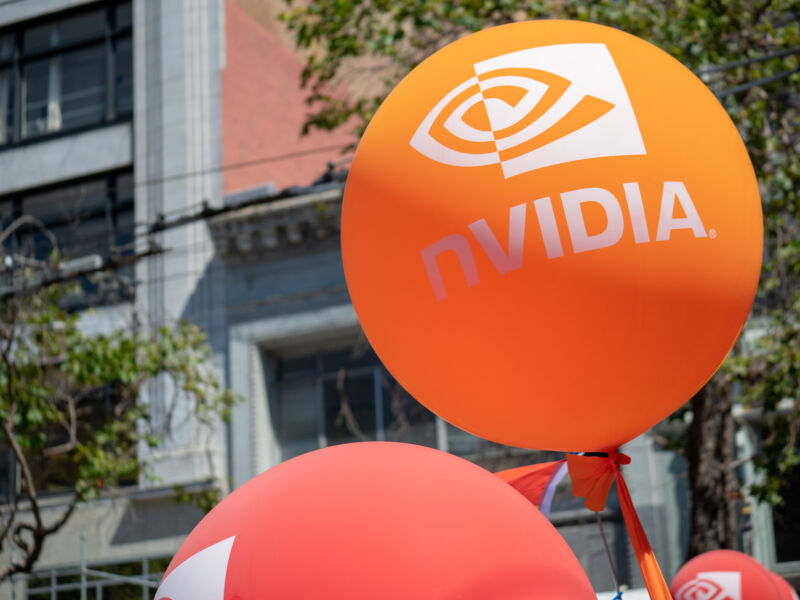
Sen. Elizabeth Warren (D-Mass.) has joined progressive groups—including Demand Progress, Open Markets Institute, and the Tech Oversight Project—pressuring the US Department of Justice to investigate Nvidia’s dominance in the AI chip market due to alleged antitrust concerns, Reuters reported.
In a letter to the DOJ’s chief antitrust enforcer, Jonathan Kanter, groups demanding more Big Tech oversight raised alarms that Nvidia’s top rivals apparently “are struggling to gain traction” because “Nvidia’s near-absolute dominance of the market is difficult to counter” and “funders are wary of backing its rivals.”
Nvidia is currently “the world’s most valuable public company,” their letter said, worth more than $3 trillion after taking near-total control of the high-performance AI chip market. Particularly “astonishing,” the letter said, was Nvidia’s dominance in the market for GPU accelerator chips, which are at the heart of today’s leading AI. Groups urged Kanter to probe Nvidia’s business practices to ensure that rivals aren’t permanently blocked from competing.
According to the advocacy groups that strongly oppose Big Tech monopolies, Nvidia “now holds an 80 percent overall global market share in GPU chips and a 98 percent share in the data center market.” This “puts it in a position to crowd out competitors and set global pricing and the terms of trade,” the letter warned.
Earlier this year, inside sources reported that the DOJ and the Federal Trade Commission reached a deal where the DOJ would probe Nvidia’s alleged anti-competitive behavior in the booming AI industry, and the FTC would probe OpenAI and Microsoft. But there has been no official Nvidia probe announced, prompting progressive groups to push harder for the DOJ to recognize what they view as a “dire danger to the open market” that “well deserves DOJ scrutiny.”
Ultimately, the advocacy groups told Kanter that they fear Nvidia wielding “control over the world’s computing destiny,” noting that Nvidia’s cloud computing data centers don’t just power “Big Tech’s consumer products” but also “underpin every aspect of contemporary society, including the financial system, logistics, healthcare, and defense.”
They claimed that Nvidia is “leveraging” its “scarce chips” to force customers to buy its “chips, networking, and programming software as a package.” Such bundling and “price-fixing,” their letter warned, appear to be “the same kinds of anti-competitive tactics that the courts, in response to actions brought by the Department of Justice against other companies, have found to be illegal” and could perhaps “stifle innovation.”
Although data from TechInsights suggested that Nvidia’s chip shortage and cost actually helped companies like AMD and Intel sell chips in 2023, both Nvidia rivals reported losses in market share earlier this year, Yahoo Finance reported.
Perhaps most closely monitoring Nvidia’s dominance, France antitrust authorities launched an investigation into Nvidia last month over antitrust concerns, the letter said, “making it the first enforcer to act against the computer chip maker,” Reuters reported.
Since then, the European Union and the United Kingdom, as well as the US, have heightened scrutiny, but their seeming lag to follow through with an official investigation may only embolden Nvidia, as the company allegedly “believes its market behavior is above the law,” the progressive groups wrote. Suspicious behavior includes allegations that “Nvidia has continued to sell chips to Chinese customers and provide them computing access” despite a “Department of Commerce ban on trading with Chinese companies due to national security and human rights concerns.”
“Its chips have been confirmed to be reaching blacklisted Chinese entities,” their letter warned, citing a Wall Street Journal report.
Nvidia’s dominance apparently impacts everyone involved with AI. According to the letter, Nvidia seemingly “determining who receives inventory from a limited supply, setting premium pricing, and contractually blocking customers from doing business with competitors” is “alarming” the entire AI industry. That includes “both small companies (who find their supply choked off) and the Big Tech AI giants.”
Kanter will likely be receptive to the letter. In June, Fast Company reported that Kanter told an audience at an AI conference that there are “structures and trends in AI that should give us pause.” He further suggested that any technology that “relies on massive amounts of data and computing power” can “give already dominant firms a substantial advantage,” according to Fast Company’s summary of his remarks.























+ There are no comments
Add yours